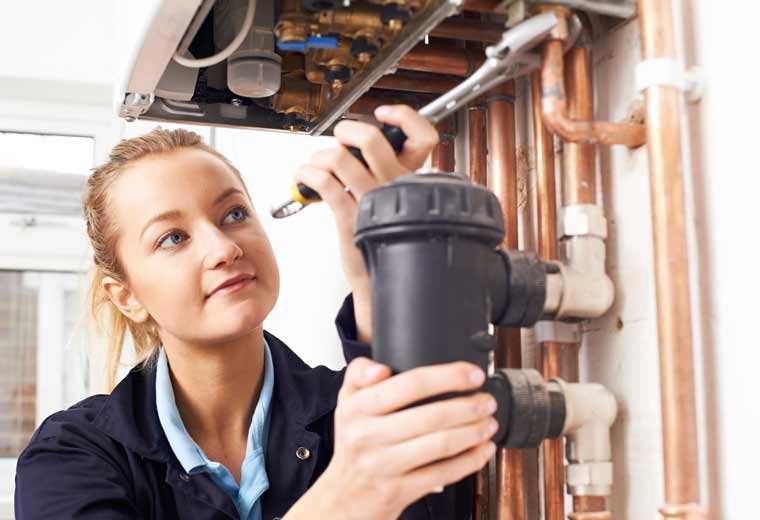When cooler weather takes hold and autumn is in full swing, most of us switch on our central heating to warm our homes. Late autumn, winter and early spring are when we rely on our boilers the most and as such, it’s when our boilers work the hardest. Follow our top tips for boiler health to ensure your boiler keeps you warm this winter.
Service your boiler annually
Getting your boiler serviced regularly is vital to keep it in great working condition. If you haven’t had your boiler serviced yet this year, book an appointment with a Gas Safe Registered engineer. Your engineer will clean all the parts and components in your boiler and check that they are all in good working order. Having your boiler serviced will also make sure it’s running at peak efficiency. Build-ups of grime and parts in need of replacement all add up to an inefficient boiler, and that will hit you in your pocket.
Finally, an annual service is also usually required to maintain your boiler’s warranty. This applies no matter who made your boiler. With warranties of up to ten years on many boilers, it’s just not worth losing that right by missing a service.
Check your heating regularly
Even if you don’t feel the need to have your heating on regularly yet, it’s beneficial to switch it on for short periods from time to time to check everything is working correctly. Keeping your heating off for long periods of time during warm weather means that when you do switch your heating on, your boiler has to work harder to warm up.
Also, if you do find out that your central heating has stopped working, we’re sure you’d much rather it happened in August than January, as you might often have to wait a few days before an engineer becomes available.
Familiarise yourself with your boiler instruction manual
Keep your boiler manual in an easy to find place to use as a quick reference guide over the winter months should you need it. It will give you instructions on what is the correct pressure to have, in case you need to increase or reduce it, either of which could trip the system. If you have a digital readout, your manual will also let you know what the various error messages mean. If you’ve lost the manual, you might be able to find the info on the internet, either by searching for your brand and the error message, or visiting the manufacturer’s website.
Check your pressure
Your boiler can lose pressure over time which may impact on its efficiency. Topping up your system pressure is a quick and easy job; you can find instructions on how to do this on manufacturers’ YouTube channels; Ideal Boilers’ video can be found here: How to top up the pressure on your Ideal Boiler. You can also find instructions in manufacturer’s installation manuals and if you are unsure, ask a Gas Safe Registered heating engineer for help.
Bleed your radiators
Radiators that are a cooler temperature at the bottom than the top indicate that they have air trapped inside them and need bleeding. Radiators that need bleeding prevent your heating system running at optimum efficiency and put extra strain on your system. A video on how to bleed your radiators can be found here: How To Bleed Your Radiators. Bleeding your radiators is one way to reduce pressure if it’s too high. Normal operating pressure on most boilers is between 1 and 1.5 bar. If you find it’s 2 bar or above, you should try and reduce the pressure.
Warning signs
A key way to keep your heating system healthy is to regularly check your boiler for leaks, cracks, clunking noises or black, sooty marks which may indicate your boiler may need to be checked by a Gas Safe Registered engineer. It’s also important to check outside your home to ensure any external vents, flues and airbricks are not being blocked by debris.
Blue flame
The flame in your boiler should be a strong, clear blue colour. If it appears yellow or smoky, there could be something wrong and you should call a Gas Safe Registered heating engineer immediately. Not only does a yellow flame signify an inefficient burner, it could also mean it’s producing excessive carbon monoxide (see below).
Insulate your pipes
During the cold winter months, the external condensate pipe on your boiler may freeze and stop your boiler from working. This can be prevented by using pipe insulation or keeping the heating on a constantly low setting when it’s very cold. If your condensate pipe does freeze, you can defrost it by pouring tepid water over it. Many boiler manufacturers also have videos showing you the best way to do this.
Carbon monoxide safety
As with all gas-burning appliances, boilers can produce carbon monoxide, a dangerous gas that is colourless and odourless. If you think your boiler may be faulty it should be checked by a Gas Safe Registered heating engineer as it may be producing carbon monoxide. Every home should have a carbon monoxide monitor.
Keeping your heating system healthy, particularly over winter will help keep your home safe and warm. Regular maintenance will also make for a more cost-effective heating system as your system will be running more efficiently.


